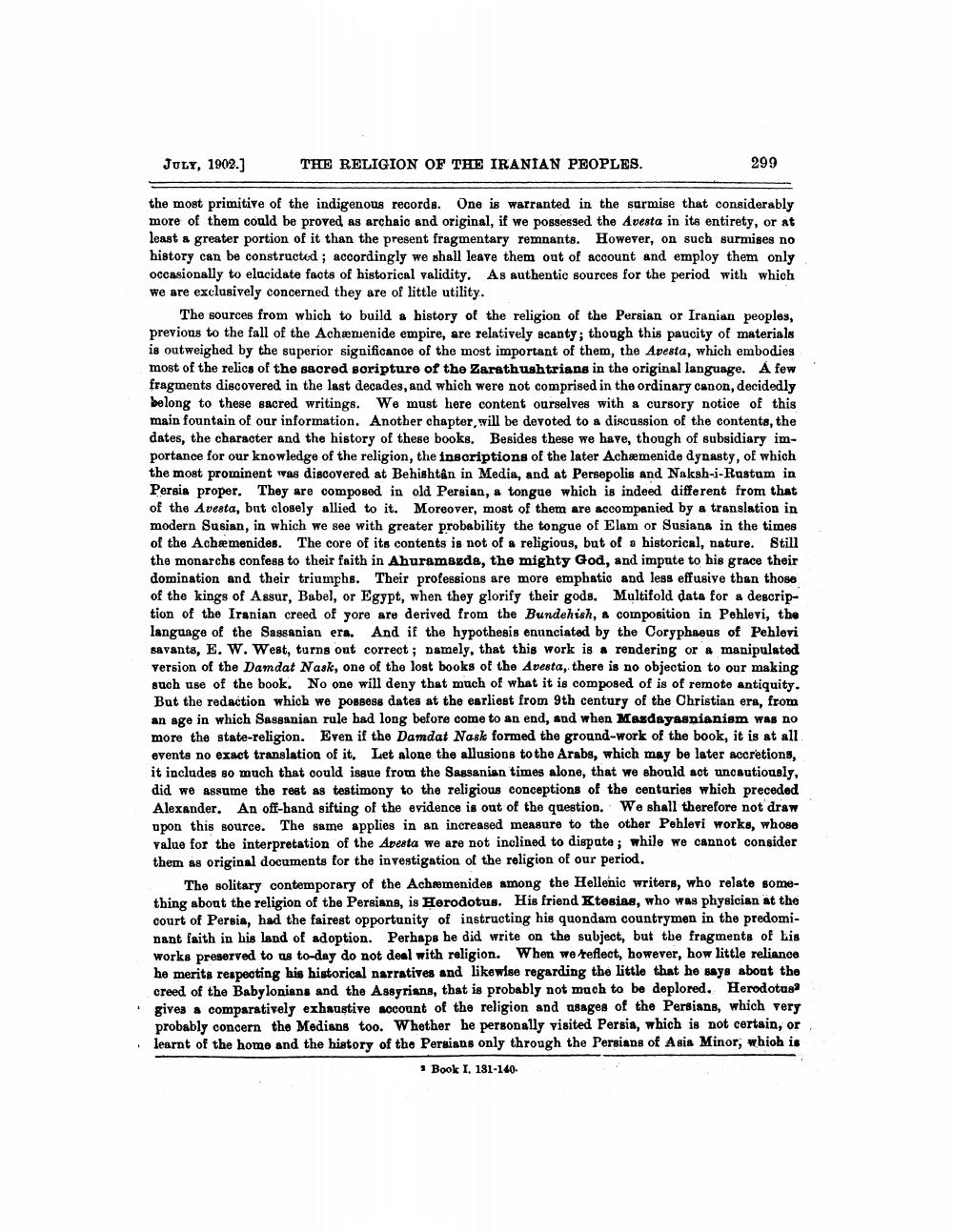________________
JULY, 1902.]
THE RELIGION OF THE IRANIAN PEOPLES.
299
the most primitive of the indigenous records. One is warranted in the surmise that considerably more of them could be proved as archaic and original, if we possessed the Avesta in its entirety, or at least a greater portion of it than the present fragmentary remnants. However, on such surmises no history can be constructed ; accordingly we shall leave them out of account and employ them only occasionally to elacidate facts of historical validity. As authentic sources for the period with which we are exclusively concerned they are of little utility.
The sources from which to build a history of the religion of the Persian or Iranian peoples, previous to the fall of the Achæmenide empire, are relatively scanty; though this paucity of materials is outweighed by the superior significance of the most important of them, the Apesta, which embodies most of the relics of the sacred soripture of the Zarathushtrians in the original language. A few fragments discovered in the last decades, and which were not comprised in the ordinary Canon, decidedly belong to these sacred writings. We must here content ourselves with a cursory notice of this main fountain of our information. Another chapter will be devoted to a discussion of the contents, the dates, the character and the history of these books. Besides these we have, though of subsidiary importance for our knowledge of the religion, the inscriptions of the later Achæmenide dynasty, of which the most prominent was discovered at Behishtận in Media, and at Persepolis and Naksh-i-Rastam in Persis proper. They are composed in old Persian, a tongue which is indeed different from that of the Avesta, but closely allied to it. Moreover, most of them are accompanied by a translation in modern Susian, in which we see with greater probability the tongue of Elam or Susiana in the times of the Achæmenides. The core of its contents is not of a religious, but of a historical, nature. Still the monarchs confess to their faith in Ahuraməzda, the mighty God, and impute to his grace their domination and their triumphs. Their professions are more emphatic and less effusive than those of the kings of Assur, Babel, or Egypt, when they glorify their gods. Multifold data for a description of the Iranian creed of yore are derived from the Bundehish, a composition in Pehlevi, the language of the Sagsanian era. And if the hypothesis enunciated by the Coryphaeus of Pehlevi savants, E. W. West, turns out correct; namely, that this work is a rendering or a manipulated version of the Damdat Nask, one of the lost books of the Avesta, there is no objection to our making such use of the book. No one will deny that much of what it is composed of is of remote antiquity. But the redaction which we possess dates at the earliest from 9th century of the Christian era, from an age in which Sasganian rule had long before come to an end, and when Masdayasnianism was no more the state-religion. Even if the Damdat Nask formed the ground-work of the book, it is at all events no exact translation of it. Let alone the allusions to the Arabs, which may be later accretions, it includes so much that could issue from the Sagsanian times alone, that we should act uncautiously, did we assume the rest as testimony to the religious conceptions of the centuries which preceded Alexander. An off-hand sifting of the evidence is out of the question. We shall therefore not draw upon this source. The same applies in an increased measure to the other Pehlevi works, whose value for the interpretation of the Apesta we are not inclined to dispate; while we cannot consider them as original documents for the investigation of the religion of our period.
The solitary contemporary of the Achæmenides among the Hellenic writers, who relate something about the religion of the Persians, is Herodotus. His friend Ktesias, who was physician at the court of Persia, had the fairest opportunity of instructing his quondam countrymen in the predomiDant faith in his land of adoption. Perhaps he did write on the subject, but the fragments of his works preserved to us to-day do not deal with religion. When we reflect, however, how little reliance he merits respecting his historical narratives and likewise regarding the little that he says about the creed of the Babylonians and the Assyrians, that is probably not much to be deplored. Herodotusa gives a comparatively exhaustive account of the religion and usages of the Persians, which very
probably concern the Medians too. Whether he personally visited Persia, which is not certain, or · learnt of the home and the history of the Persians only through the Persians of Asia Minor, which is
1 Book I. 181-140




